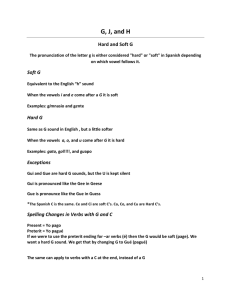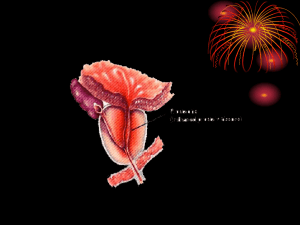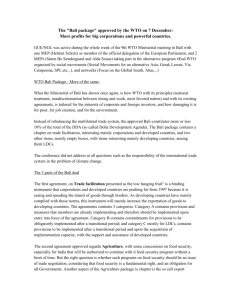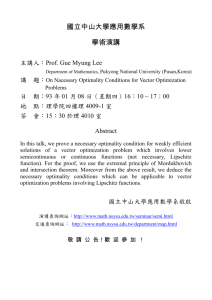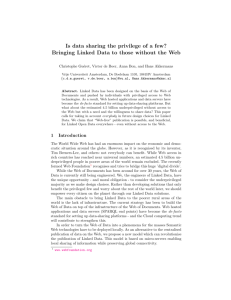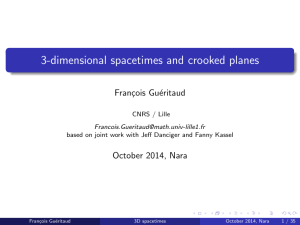x
advertisement
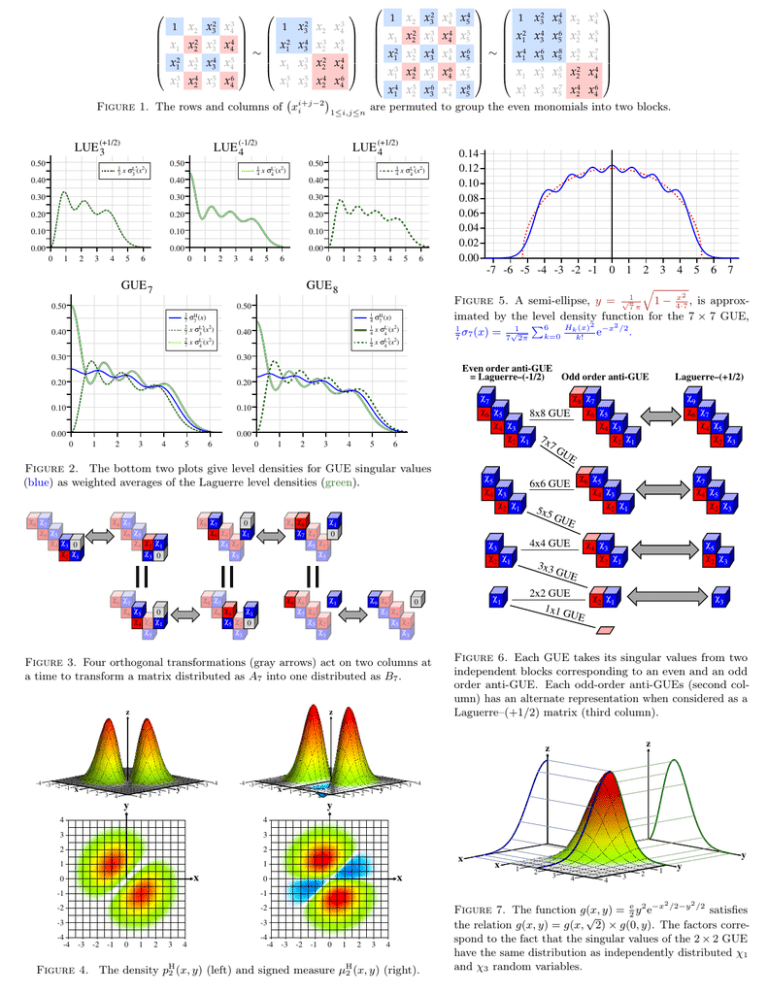
1 2 3 x 3 4 x 2 3 1 x 3 4 x x x 2 2 x x2 x3 x4 x2 x4 x3 x5 1 2 3 4 1 3 2 4 ∼ x2 x3 x4 x5 x x3 x2 x4 1 2 3 4 1 3 2 4 x13 x24 x35 x46 (+1/2) 0.50 1 3 1≤i,j≤n (-1/2) 0.50 + 1 4 0.50 - x σL4 (x2) 0.40 0.40 0.30 0.30 0.30 0.20 0.20 0.20 0.10 0.10 0.10 0.00 0 1 2 3 4 5 1 4 + x σL4 (x2) 0.00 6 0 1 2 3 4 x32 x54 x2 x43 x13 x35 x57 x24 x46 are permuted to group the even monomials into two blocks. LUE 4 0.40 0.00 1 (+1/2) LUE 4 x σL3 (x2) x14 x25 x36 x47 x58 i+j−2 LUE 3 x x2 x3 x4 x5 x2 x4 x6 x3 x5 1 2 3 4 5 1 3 5 2 4 2 3 4 5 6 4 6 8 5 7 x1 x2 x3 x4 x5 ∼ x1 x3 x5 x2 x4 x3 x4 x5 x6 x7 x x3 x5 x2 x4 1 2 3 4 5 1 3 5 2 4 x13 x35 x24 x46 Figure 1. The rows and columns of xi x2 x32 x43 x54 1 5 6 0 1 2 3 4 5 6 0.14 0.12 0.10 0.08 0.06 0.04 0.02 0.00 -7 -6 -5 -4 -3 -2 -1 GUE 7 GUE 8 0.50 0.50 2 7 2 7 2 7 0.40 1 4 1 4 1 4 σH (x) 7 + x σL3 (x2) 0.40 - x σL4 (x2) 0.30 0.30 0.20 0.20 0.10 0.10 0.00 σH (x) 7 - x σL4 (x2) + x σL4 (x2) 1 2 3 4 5 6 0 1 2 3 4 5 1 2 3 4 5 6 7 q x2 Figure 5. A semi-ellipse, y = √17 π 1 − 4·7 , is approximated by the level density function for the 7 × 7 GUE, P (x)2 −x2 /2 1 σ (x) = 7√12π 6k=0 Hkk! e . 7 7 Even order anti-GUE = Laguerre–(-1/2) Odd order anti-GUE Laguerre–(+1/2) χ7 χ8 χ7 χ6 χ5 8x8 GUE χ6 χ5 χ4 χ3 χ4 χ3 χ2 χ1 7x χ2 χ1 χ9 χ6 χ7 χ4 χ5 χ2 χ3 0.00 0 0 7G 6 UE Figure 2. The bottom two plots give level densities for GUE singular values (blue) as weighted averages of the Laguerre level densities (green). χ8 χ7 χ6 χ5 χ4 χ3 0 χ2 χ1 χ8 χ7 χ6 χ5 χ4 χ2 χ1 χ3 0 χ8 χ7 0 χ6 χ4 χ1 χ5 χ2 χ3 χ8 χ7 χ6 χ5 0 χ4 χ2 χ1 χ3 χ5 χ4 χ3 χ2 χ1 4x4 GUE χ3 χ2 χ1 χ8 χ6 χ1 χ7 χ4 χ5 χ2 χ3 z 3x3 χ7 χ4 χ5 χ2 χ3 χ4 χ3 χ2 χ1 χ5 χ2 χ3 GUE 2x2 GUE χ2 χ1 1x1 G UE χ1 χ9 χ6 0 χ7 χ4 χ5 χ2 χ3 Figure 3. Four orthogonal transformations (gray arrows) act on two columns at a time to transform a matrix distributed as A7 into one distributed as B7 . z 5x5 G χ6 χ5 χ4 χ3 χ2 χ1 UE χ8 χ6 χ1 χ7 χ4 0 χ5 χ2 χ3 χ8 χ7 χ6 χ4 χ1 χ5 χ2 0 χ3 6x6 GUE χ3 Figure 6. Each GUE takes its singular values from two independent blocks corresponding to an even and an odd order anti-GUE. Each odd-order anti-GUEs (second column) has an alternate representation when considered as a Laguerre–(+1/2) matrix (third column). z z -4 -3 -2 -1 x 1 2 3 4 4 2 3 1 y -3 -4 -1 -2 -4 -3 -2 -1 x 1 2 3 y 4 3 3 2 2 1 1 0 x -1 -2 -2 -3 -3 -2 -1 0 2 3 1 y -3 -4 -1 -2 1 2 3 4 -4 -4 x x x 0 -1 -3 4 y 4 -4 -4 4 x y y 1 2 3 4 4 3 2 y 1 2 -3 -2 -1 0 1 2 3 4 H Figure 4. The density pH 2 (x, y) (left) and signed measure µ2 (x, y) (right). 2 Figure 7. The function g(x, y) = 2e y 2 e−x /2−y /2 satisfies √ the relation g(x, y) = g(x, 2) × g(0, y). The factors correspond to the fact that the singular values of the 2 × 2 GUE have the same distribution as independently distributed χ1 and χ3 random variables.

